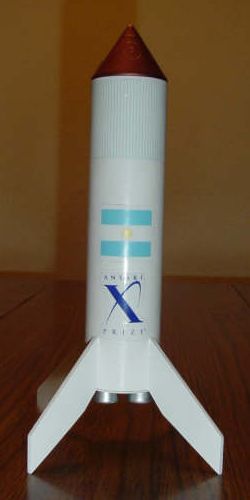| Construction Rating: | starstarstarstarstar |
| Flight Rating: | starstarstarstarstar |
| Overall Rating: | starstarstarstarstar |
| Diameter: | 1.54 inches |
| Length: | 8.60 inches |
| Manufacturer: | Estes  |
| Skill Level: | 1 |
| Style: | Scale |

Brief:
The Estes X-Prize Gauchito is a 1:55 scale model of Pablo de Leon and
Associates' Ansari X-Prize entry. This model flies on 13mm motors up to 300
feet, recovers on a 12 inch parachute and has a removable display nozzle
assembly.
Construction:
The kit came packaged in a plastic bag with header card and included the body
tube, motor mount tube, motor retention hook, motor block, retaining ring,
centering rings, shock cord, 12 inch pre-assembled plastic parachute, launch
lug, laser cut balsa fin sheet, 1 plastic part set that included the capsule
and insert, display base and nozzles and decals.
The instructions were typical Estes material containing lots of illustrations and text and included the fin marking guide and shock cord mount.
This is a skill level 1 Beta Series kit. I found it very easy to build with no issues. I started construction by assembling the motor mount assembly as instructed. I then sanded the fin sheet and cut out the fins. This laser cut balsa was very easy and great to work with as the fins practically fell out of the sheet with very minimal cutting. I stack sanded the fins to even up all edges. I cut out the fin marking guide and I slightly scuffed up the surface of the body tube and marked all fin and launch lug lines. I installed the motor mount inside the body tube at this time. After it dried, I attached the fins one at a time. While the fins were drying, I assembled the shock cord mount. After the fins dried, I mounted it into the open end of the body tube. I also assembled the capsule at this time. I then applied fillets to the fins and launch lug to finish the assembly. I now prepped the model for finishing.
PROs: Easy and quick assembly.
CONs: None.
Finishing:
I started by sanding the model smooth and sprayed the model with Ace brand
white primer and sanded between coats. I then sprayed the body and display
nozzle base with gloss white enamel, the capsule with Testor's copper enamel,
and the display nozzles with Testor's silver enamel. I found it much easier to
paint the nozzles by using loops of masking tape to tape them to a balsa stick
than using a paint pen to paint them in place on the nozzle base as the
instructions suggested. After the white dried, I chipped off some of the white
on the nozzle base and then glued the nozzles into place on the nozzle base. An
optional step was to spray the model with clear enamel but I decided to pass on
this step. I then applied the peel and stick decals to finish the model.
Overall, the model looked rather cute and surprisingly realistic.
PROs: Easy to finish, no difficult masking required to achieve the stock paint scheme.
CONs: None.
Construction Rating: 5 out of 5
Flight:
The recommended motors for this kit is the 1/2A3-2T, A3-4T, A10-3T--all 13mm
mini motors. This rocket does require the use of recovery wadding and the motor
hook holds the motor in place during flight, however, the display nozzle unit
must be removed to fly this model.
I prepped the model by removing the nozzle unit to expose the motor mount, prepped a 1/2A-2T motor for this flight, added about 4 sheets of recovery wadding, and packed the chute into place.
The model took off slowly but straight and went maybe 75-100 feet up under the 1/2A, deployed the chute, and recovered safely.
The next flight was on an A10-3T. This is the motor I'd stick with for this rocket. The rocket took off straight and quick and went maybe 250-300 feet up, deployed the chute, and returned safely. Upon recovery, I noticed that the capsule had separated from the insert. Luckily, I was able to find it. You might want to use CA for this step during construction to keep this from happening to you.
PROs: Very nice and low (100-300 feet) flights.
CONs: None.
Recovery:
This rocket uses a 12 inch parachute which is sized about right for it and
there is a marking for a spill hole on the chute if you feel that you need the
model to descend faster. The rubber shock cord held up very well. Even after
two flights, I did not notice any scorching on it.
PROs: Recovers nicely under the stock chute.
CONs: None.
Flight Rating: 5 out of 5
Summary:
I really liked building and flying this nice scale rocket. I found it very easy
to build and fly and I was impressed with the scale detail on it also. I
thought the display nozzle unit on it was a great idea and it made for a nice
touch. I would highly recommend this kit. I'm sure you could also use a lot of
the parts to clone a Little Joe II as some folks on The Rocketry Forum have
mentioned. At about $5.79, I felt it was a great value.
Overall Rating: 5 out of 5
Other Reviews
- Estes X-Prize Gauchito By Brian Ray (January 16, 2009)
This modification was my own personal response to what I had seen as an all-too-common statement on model rocket forums: add nose weight. It seemed to me that no matter the situation, the clarion call was for more and more nose weight. "Hey, I painted this rocket blue instead of yellow." "You better add some nose weight." While not usually a kit builder, I found this kit on clearance and decided ...
 |
 |
Flights
 |
 |
G.O.D. (May 27, 2008)
R.J.K. (October 2, 2008)
D.S. (January 9, 2009)
Sponsored Ads
 |
 |












B.A. (March 8, 2006)